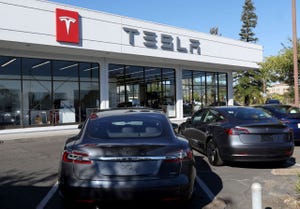Smart Factory Predictions for 2025Smart Factory Predictions for 2025
Tech-enhanced humans, cloud, carbon monitoring and AI will top the smart factory agenda next year

The manufacturing industry is often bombarded by tech companies and consultants pushing pipedream technologies nowhere near ready for deployment in most factory settings. Despite this, the smart factory movement keeps marching on, driven by practical, down-to-earth tools that manufacturers can deploy at scale to deliver rapid ROI. When it comes to technologies that matter, we believe four areas will have an outsized impact in 2025.
Generative AI Will Unlock New Value for Mainstream Manufacturers
All manufacturers use data in some form today and we see huge volumes collected from machines and IoT devices on the factory floor. New generative AI tools will make it easier for manufacturers of all sizes and specialisms to identify problems and improve processes by automatically recommending actions from their data.
AI and machine learning will move mainstream in 2025, going beyond isolated pilot projects and large manufacturers with dedicated data teams. Generative AI could make predictive maintenance standard practice and support a raft of process improvements that drive quality, productivity and sustainability.
Tech-Enhanced Humans to Power the Factory Floor
Manufacturing needs skilled people, but the industry has a talent crisis that makes them harder to find and much more expensive. The best option is for manufacturers to enhance the productivity of their people with technology.
In 2025, many manufacturers will augment their people with a range of proven, practical and intuitive technologies that make them more productive. They include smart devices to improve communication between the top and shop floors, AI to spot problems and drive decisions on the shop floor, automation, exoskeletons and semi-autonomous cobots for material handling tasks.
Cloud Will Become the Dominant Form of Computing in Manufacturing
When we founded FourJaw in 2020, most manufacturers we spoke to used on-premise IT infrastructure in their factories. Since then, there has been a big shift towards cloud computing, a significant enabler of the smart factory movement. The cloud has become the default setting for new manufacturing technologies.
Although more manufacturers use the cloud to host their data and applications than on-premise IT today, we suspect most of their data remains in the factory as many manufacturers still rely on local hardware for older software. This hybrid approach will remain the case for some time, but given the typical lifespan of servers, we believe 2025 could be the year cloud becomes the dominant form of manufacturing computing, not just for users but the volume of data and applications too.
New Regulations Will Spark a Boom in Sustainable Manufacturing
A wave of new legislation will drive an even greater focus on sustainability in factory settings. Until now, many sustainability initiatives have been driven by cost and ESG considerations. New rules such as the Carbon Border Adjustment Mechanism, which will be fully operational at the start of 2026, are putting regulatory and financial pressure on manufacturers to understand and reduce carbon emissions from production.
Manufacturers need to know precisely how much carbon is emitted by every unit they sell. We are seeing a concerted effort from manufacturers to understand the power drawn by each machine and production process to ensure they can measure their carbon emissions properly.
About the Author
You May Also Like






